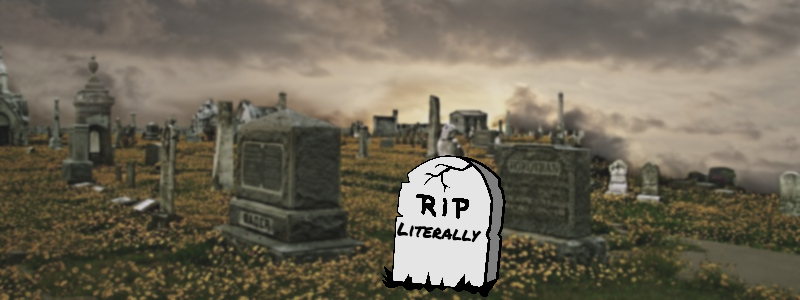 Rest in peace, literally. It’s not the first time, but it is one of the most recent. The misuse of the word “literally” as a substitute for “figuratively” has become an accepted definition. Many major dictionaries, including perhaps the most-used modern dictionary, dictionary.com, now include some version of “figuratively” as an accepted use of the word “literally.”
Rest in peace, literally. It’s not the first time, but it is one of the most recent. The misuse of the word “literally” as a substitute for “figuratively” has become an accepted definition. Many major dictionaries, including perhaps the most-used modern dictionary, dictionary.com, now include some version of “figuratively” as an accepted use of the word “literally.”
I don’t consider myself a pedant (well, about most things), and I’m all for creating and creatively using words, but I think this one went too far. Not only are the definitions of “literally” inconsistent, the new definition is the exact opposite of the other accepted definitions. Dictionary.com gives us four definitions for “literally:”
1. in the literal or strict sense: She failed to grasp the metaphor and interpreted the poem literally.
What does the word mean literally?
2. in a literal manner; word for word:
to translate literally.
3. actually; without exaggeration or inaccuracy:
The city was literally destroyed.
4. in effect; in substance; very nearly; virtually:
I literally died when she walked out on stage in that costume.
(Definition from dictionary.com.)
In the immortal words of Sesame Street: “One of these things is not like the others; one of these things just doesn’t belong.”
My problem here is not that words cannot be used to express new concepts or meanings. And we’re not playing Scrabble with our everyday language; to a large extent, as my 13-year-old son says, “If you understood what I meant, then it was a real enough word.” (Note: this is not a good practice to use in any official, academic, or business writing, but works in normal, everyday conversation. Also, try to do it without the eye roll that has been perfected by 13-year-olds throughout the ages.)
No, the problem is that instead of helping someone understand a concept, this use of the word “literally” makes the concept less precise, it leads to unnecessary ambiguity. Sure, contextual clues will usually let us know which whether the speaker or writer using “literally” really means “literally” or “figuratively,” but with all of the other good words out there, why misuse a perfectly good word like “literally” as its exact opposite? Yes, I’m pretty sure the speaker did not “literally die” when so-and-so walked out on stage in that costume, but couldn’t the speaker have expressed the same feelings with “I almost died” or some similar phrase?
Don’t worry, my rant is almost over.
Writers should strive for clarity; there’s seldom a good reason for purposeful ambiguity. Unless you’re writing dialogue for a specific character, you should avoid using “literally” to mean “figuratively.” Feel free to use “virtually” or “almost” or just about anything other than “literally” unless you mean it, well, literally.
And for those who truly care about words and want to avoid their needless slaughter, please stop using “literally” as “figuratively” in conversation. Please, it literally makes my head hurt.
You were a good word, literally. I’m sorry this had to happen to you. You will be missed.


